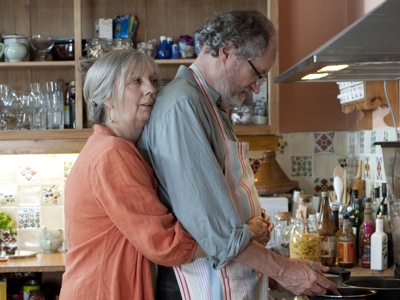
The British film director Mike Leigh, as I understand it, has a reputation for depressing British naturalistic dramas (at least in HMC discourse). Happy-Go-Lucky (2008), with its ebullient heroine, Poppy, traversing a shabby London accompanied by wind instruments, had its frightening moments (Poppy in a car with a mentally unstable driving instructor) but resolved itself with Poppy and her friend swanning around in a rowboat.
Another Year (2010) seemed more of a gamble.
We were promised a cheerful movie with a bit of melancholy. It began hopefully. As the title suggests, the film is structured by the seasons. Spring begins - after a medical interview with a grim-faced woman (Imelda Staunton) who has trouble sleeping and cannot remember ever being happy - with a long-married couple working peacefully in an allotment. The gardening threads through the film and provides a competent metaphor for a script dealing with the relations between people. At the nexus of the web of relationship is Tom (Jim Broadbent), a geologist, and his stork-eyed counsellor wife Gerri (Ruth Sheen), and it is a happy marriage. Their home seems a happy beacon of light and warmth as they offer hospitality to friends whose lives require, one might say, pruning. Mary, a single woman who works with Gerri, talks and drinks too much, and vibrates with bizarre anxious energy. She falls asleep, maudlin, in Tom and Gerri’s son’s room, with the couple looking on, sharing pregnant glances. Tom’s friend Ken from Yorkshire drinks and eats too much and cries into his hands.
But towards the end of the film the couple’s influence, which seems benign and bettering at the beginning, seems ennabling and manipulative. In the last scene of the last section, Winter, Mary intrudes uninvited after offending the family, and shivering, blinking, and spiritually disintegrated, begs Gerre for a former friendship. Gerri withholds austerely and Mary looks like less of an inconvenience than a housedog. She has been trained to rely on Gerri and Tom and, without their benevolence, is lost and utterly alone. Mary, insomniac and unhappy, is the Staunton-character, and the narrative has come full-circle. Only, instead of Gerri as healer (she treated ‘Staunton’), she is an enabler, a sanctimonious observer who speaks calmly and parentally: ‘I’m not angry with you, Mary. Just disappointed.’ The film ends with Mary’s weary and wary face twitching imperturbably as the family discusses their traveling adventures, leaving Mary outside the enchanted circle, to look on with – no longer envy – but a dying, wintering, reiterated sense of aloneness.
The possible romanticism present in Happy-Go-Lucky was undone in Another Year. The former trumpeted the enchanted freedom of an energetic single in Camden; the latter featured a single – and other (self-)marginalized characters – obliterated by the happy exclusion of a couple whose influence wavers uncomfortably between friendship and condescension. Leigh’s film didn’t leave me comforted, but sad, cold, melancholic, and impressed.
Comments
It must be a magical day :)
I thought Another Year was a withering, grim movie.